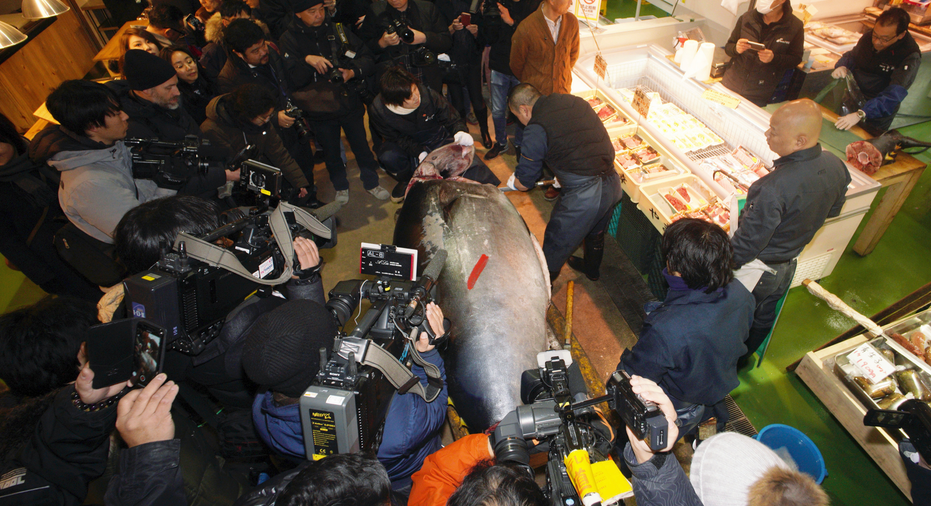Bluefin tuna sold for $320,000 in Tsukiji's last new year

TOKYO – An 892 pound (405 kilogram) bluefin tuna has sold for 36.5 million yen ($320,000) in what may really be Tsukiji market's last auction at its current site in downtown Tokyo, local media reports said Friday.
The winning bid for the prized but threatened species at the predawn auction was well below the record 155.4 million yen bid at 2013's annual New Year auction. It amounts to about 90,000 yen ($798) per kilogram and was paid by a local wholesaler, the reports said.
This year's top per kilogram price, for a smaller tuna, was $1,419 per kilogram, compared with about $7,930 per kilogram for the 2013 record-setting auction price, the Nihon Keizai Shimbun and other local media reported. The 30.4 million yen ($260,000) price was paid by Kiyomura Corp., whose owner Kiyoshi Kimura runs the Sushi Zanmai chain, the reports said. Kimura has often won the annual auction in the past.
The new year auction prices are way above the usual price paid for bluefin tuna at Tsukiji, which at the end of the year was 4,500 yen ($40) per kilogram.
"Obviously the price doesn't reflect the true market price of the fish. It's wrapped in with the ceremonial aspects of the auction," said Jamie Gibbon of the Pew Trust's global conservation team.
The reports said the top priced tuna was one of the biggest ever sold at the auction.
Last year's New Year auction was supposed to be the last at Tsukiji's current location, as was the New Year auction the year before. The market's shift to a new facility on a former gas plant site on Tokyo Bay has been repeatedly delayed due to concerns over soil contamination.
Japanese are the biggest consumers of the torpedo-shaped bluefin tuna, and surging consumption here and overseas has led to overfishing of the species. Experts warn it faces possible extinction, with stocks of Pacific bluefin depleted by more than 97 percent from their pre-industrial levels.
There are signs of progress toward protecting the bluefin, though. Japan has begun enforcing laws banning catches that exceed quotas, with violators subject to fines or possible jail time.
Japan and other governments recently agreed on a plan to rebuild Pacific bluefin stocks, with a target of 20 percent of historic levels by 2034.
"There are good signs coming out of late 2017," Gibbon said in a phone interview. But he added, "We want to see countries reaffirm their commitment to strong domestic management so that they don't exceed their catch quotas."
Tsukiji is one of Tokyo's most popular tourist destinations as well as the world's biggest fish market. It was due to move to the new site, at Toyosu, in 2016. Tokyo Gov. Yuriko Koike postponed the relocation but after months of political haggling and uncertainty she announced the move would go ahead.
The new market is due to open on Oct. 11, 2018.
Tsukiji is due to eventually be redeveloped. The plan to move was unpopular with many of the businesses in and around the market.



















